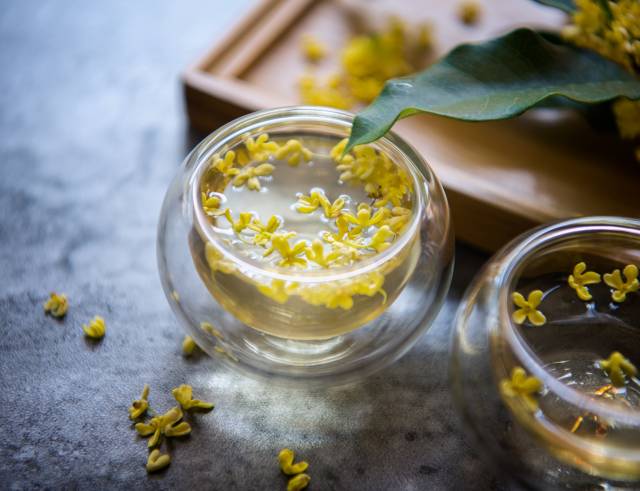Osmanthus tea benefits are not well known in the United States, but they are abundant in Asian countries. Osmanthus tea is made from the flowers of osmanthus oleifera which grows in China, Taiwan and Japan. This plant produces small fragrant white flowers that become a rich purple as they age.
This tea has been enjoyed traditionally throughout China, Japan and Korea for hundreds of years. It has been used to treat many ailments because of its powerful antioxidants that prevent cell damage by fighting free radicals.
This tea is a natural diuretic and has been used to treat diabetes, low blood pressure, kidney disease and many other conditions. It has also been used in traditional Chinese medicine to relieve pain and help heal wounds.
In addition to the traditional health benefits of osmanthus tea, it has become one of the most popular teas in the U.S. because it is very flavorful and aromatic. It can be enjoyed plain or mixed with other types of tea for a unique flavor that will excite your taste buds.
Many people enjoy the sweet taste of osmanthus tea and have used it for centuries to treat many health problems. It is a very popular beverage throughout Asia and has been used for years to treat all types of health conditions.
Osmanthus tea benefits are numerous, and they include:
Respiratory System:
Osmanthus tea benefits include helping to fight lung conditions such as asthma and bronchitis. It contains antioxidants that help neutralize the toxins in your body that cause these conditions. The antioxidants in this tea also help your lungs produce more mucus than normal, which further helps to clean out your lungs and remove the excess mucus.
Liver Toxicity:
Osmanthus tea benefits include protecting the liver from toxicity by keeping it clean and healthy. This is because it contains antioxidants that prevent free radicals from damaging the liver, which can lead to liver damage.
Heart Disease:
Osmanthus tea benefits include reducing the amount of fat in your blood, which can lead to heart disease.
Lung Cancer:
Osmanthus tea benefits include reducing the risk of lung cancer by increasing the production of anti-cancer enzymes in your lungs.
Stomach Ulcers:
Osmanthus tea benefits include healing ulcers and other stomach conditions by reducing inflammation in your stomach lining.
Weight Loss:
Osmanthus tea benefits include helping to lose weight by increasing metabolic rate, which burns more calories than usual when you are not at rest. The antioxidants in this tea provide energy for you to exercise and help you lose weight even if you are not physically active when you are consuming this tea.
Skin Problems:
Osmanthus tea benefits include treating skin problems like eczema and psoriasis by reducing inflammation in your skin. It also stops the breakdown of collagen in your skin, which can lead to fine lines and wrinkles.
What is the caffeine content in Osmanthus tea?
The caffeine content of the Osmanthus tea is 1.4-6.7%. This amount of caffeine is equivalent to approximately 1-2 cups of coffee. You can enjoy this tea as a hot beverage or use it for making a cold beverage.
What is the flavor of Osmanthus tea?
Osmanthus tea has a light floral flavor with notes of apricot, peach and orange that taste great in both cold and hot teas. In addition, there are many variations to this flower tea, as it can be brewed like green tea or as an oolong tea. The flavor and aroma of the Osmanthus Flower Tea are quite pleasant and inviting to all.
How to prepare Osmanthus tea?
Osmanthus flower tea can be made the same as other teas. However, it is recommended to brew it in a pot that has a filter. Otherwise, you may end up with a bitter taste in your mouth. Use filtered water or spring water for brewing this tea. You will need approximately 3-4 grams of loose leaf tea per cup of water. You can also choose to use a Chinese teapot for making this tea, but you may need to use more leaves than if you used other types of teapots.
The amount of leaves that you use depends on how much tea you want to make at a time. A larger pot will yield more flowers, while a smaller pot will yield less. You can use more or less leaves, depending on how strong you want your tea to be.
Remove the flowers and set aside. Use a fine mesh strainer to strain the flowers from the leaves. You can also use a tea ball for this purpose, but you may not be able to remove all of the flowers from the leaves. If so, you may want to add more tea leaves when you brew this tea again.
Use a teapot that has a lid for brewing this herbal tea. Do not steep too long, especially if you are brewing with loose leaf tea. This will cause bitter flavors and make your Osmanthus Flower Tea taste bitter and unpleasant. You can also brew this tea with a clay teapot.
Conclusion:
Osmanthus Flower Tea is a very popular herbal tea that has been consumed for centuries in China and other Asian countries. In addition, this tea is known to be very beneficial for the respiratory system, liver toxicity and alleviating stomach ulcers. It is also used to help with weight loss, skin conditions, lung cancer and heart disease.
Osmanthus Flower Tea contains many antioxidants that fight free radicals that cause cancer, heart disease and other health problems. It works by reducing cell damage caused by free radicals in your body. This tea also helps to reduce the amount of fat in your blood which can lead to heart disease.
Osmanthus Flower Tea helps to heal ulcers and other stomach problems by reducing inflammation in your stomach lining. This tea also helps to control cholesterol levels in your blood that can lead to heart disease.


